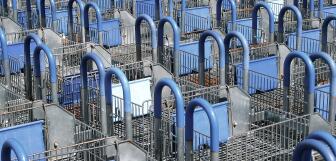How to Buy Wholesale: A Guide for Retailers and Business Owners
So, you're diving into the world of retail? One of the initial puzzles to solve is where to get your products from. Basically, you're looking at buying stuff in bulk from wholesalers.
Most retailers don't manufacture their own goods. Instead, they rely on wholesalers to supply them. These wholesalers aren't just handy for stocking your shelves; they can also adapt as your business grows.
Buying wholesale might feel like stepping into the unknown at first. That's why we're here to share some pointers on how to kickstart this process. We'll cover everything from finding wholesalers to snagging those wholesale prices.
Here's what we'll dive into:
- What exactly is buying wholesale?
- Where to find wholesale suppliers
- How to pick the right wholesale products
- Tips for purchasing high-quality products in bulk
- Any other key things to keep in mind when buying wholesale
Let's get started.
What does buying wholesale mean?
Ever wondered how businesses get their hands on the products they sell? Well, there are two main routes: wholesale and retail. When you opt for wholesale, you're essentially cutting out the middleman between your store and the manufacturer.
Wholesale purchases usually mean buying in bulk, and because of that, you snag a discounted price. Once you've got your goods from the wholesale companies, you can sell them in your shop or online store at a higher price to turn a profit. That higher price? That's what we call the retail price – what your customers pay when they shop with you. They're cool with paying more because you're handling all the logistics, from buying and storing wholesale items to providing top-notch customer service.
Buying directly from manufacturers can be tempting since it cuts out even more middlemen, potentially lowering the cost per unit. But here's the catch: manufacturers often sell in huge quantities, which might not be feasible for smaller online retailers. Plus, they might not offer the same variety as wholesalers.
So, which route should you take? It all boils down to factors like your business model, your products, your target market, and your financial situation. If you've got a killer product line and want full control over how it's sold and showcased, going the retail route could be the way to roll.
Wholesale vs retail
When it comes to buying from wholesalers versus retailers, each option comes with its own set of pros and cons.
Buying from wholesalers offers the advantage of a lower cost per unit, thanks to the fact that you get to buy in bulk and benefit from economies of scale. However, this route may require buying in large quantities, potentially leading to overstocking or tying up cash flow.
On the other hand, buying from retailers provides flexibility in purchasing smaller quantities but often at a higher cost per unit. The difference between the wholesale and retail prices is called the margin, representing the profit a retailer makes from a sale. Retail prices vary between businesses, and different pricing strategies can be employed to determine the best retail price for a product. Once the retail price is established, calculating the gross profit becomes straightforward.
How do you price wholesale items for resale?
Pricing wholesale items for resale involves understanding the gross profit formula, which is Gross Profit = Revenue – Cost of Goods Sold (COGS). Your revenue is essentially the retail price you charge your customers, while COGS encompasses all variable costs associated with procuring and selling the goods. Since you're purchasing from a wholesaler, your COGS is typically the price you pay for the product.
The gross profit represents the money you make from a sale. Retailers commonly markup the price of goods bought wholesale to turn a profit. For instance, if you buy a t-shirt at a wholesale price of $2 and sell it in your store for $10, your markup is $8, and the gross profit from that sale is $8.
When setting your retail prices, it's crucial to consider your wholesaler's pricing. If their prices are too high, it can impact your business's overall profitability. Additionally, your retail prices must align with your market to remain competitive and retain customer loyalty, considering that customers have easy access to alternatives online or in other stores.
Wholesalers often impose minimum order requirements (MOQs) before conducting business. These MOQs ensure wholesalers can sell their products in bulk, optimising their production and distribution processes. Retailers need to factor in MOQs when purchasing from wholesalers, as it can affect cash flow and inventory management.
Payment terms in wholesale purchasing refer to the agreement between the buyer and supplier regarding payment timing. Terms can vary from payment in advance to payment after delivery or within a specific time frame after the invoice date. Understanding and negotiating payment terms is crucial for maintaining cash flow and building positive supplier relationships.
To optimize your ordering process, focus on ordering your top-selling items from wholesalers, using your retail POS system to identify your best sellers and most profitable products. This strategy helps ensure you meet minimum order requirements while maximising your revenue and inventory management efficiency.
Can I buy my wholesale products from a manufacturer?
Yes, you can buy wholesale directly from a manufacturer in certain cases. Typically, a product undergoes several steps before reaching retail shelves:
- The manufacturer creates the products.
- The distributor facilitates sales between the manufacturer and the wholesaler and sometimes between the manufacturer and retailers.
- The wholesaler collaborates with the distributor to buy products in bulk.
- The retailer purchases smaller quantities from the wholesaler (or distributor) to sell individual items to consumers.
Some manufacturers also act as distributors and wholesalers. In this scenario, you'd buy wholesale items directly from the manufacturer. Big names like Apple and Nike produce their own goods, which are then sold in bulk to retailers and sometimes directly to consumers in their stores.
Distributors play a crucial role in the wholesale business by bridging the gap between manufacturers and retailers in the supply chain. They handle the distribution of products from manufacturers to wholesalers or directly to retailers. Distributors buy in bulk from manufacturers and then sell to wholesalers or directly to retailers. Unlike wholesalers, distributors often have a closer relationship with the manufacturer and may even hold exclusive rights to distribute products in specific geographical areas.
However, in most cases, retailers will go through wholesalers or B2B wholesale marketplaces to procure goods. This is because manufacturers typically allocate their budgets toward manufacturing rather than marketing, leaving distribution and marketing tasks to distributors and wholesalers.
Where to find wholesale suppliers
Finding a wholesaler can be approached in various ways, offering flexibility in how you navigate the process. Here's how you can do it:
- Individual approach: You can directly approach wholesalers or distributors on your own. This method involves reaching out to potential wholesalers individually to establish partnerships.
- B2B wholesale marketplaces: Alternatively, you can utilize B2B wholesale marketplaces to streamline the process. Platforms like NuORDER bring together wholesalers and retailers, providing a convenient space to browse and order products efficiently.
Now, let's dive into the types of wholesalers you might encounter:
- Manufacturers: Some manufacturers also serve as wholesalers. Buying directly from a manufacturer might offer lower wholesale prices due to the lack of middlemen. However, this option isn't always available or convenient.
- Retail wholesalers: These wholesalers sell products in bulk to retailers, typically at a slight markup from manufacturers. Buying through retail wholesalers allows you to access wholesale items from multiple manufacturers.
- Merchant wholesalers: Unlike retail wholesalers, merchant wholesalers sell to both retailers and end customers. They often have lower minimum order sizes and can be both your competitors and wholesale suppliers.
Each type of wholesaler offers its own set of advantages and considerations, depending on factors like the items you're purchasing, your retail niche, relationship-building capabilities, and preferred wholesale ordering technology. Ultimately, the choice of wholesaler type depends on your specific business needs and preferences.
Where to find and buy wholesale products
When it comes to sourcing wholesale products, navigating online platforms can sometimes feel like a gamble. Not all aggregator sites rigorously vet their wholesalers, and not every legitimate wholesaler boasts a high-ranking or polished website. Trust can be a concern, especially in large marketplaces where reliability isn't always guaranteed. Tapping into your network of fellow business owners for recommendations can provide valuable insights into which wholesalers to explore and which ones to steer clear of.
Trade shows and expos offer a unique opportunity for retailers to connect with wholesalers and manufacturers in person. These events facilitate the discovery of new products, the negotiation of deals, and the establishment of lasting business relationships. They also serve as invaluable platforms for staying abreast of market trends and gaining insights from industry experts.
For a reliable online source of wholesalers, consider turning to B2B wholesale marketplaces with stringent standards for brands. These platforms simplify the process of finding wholesale items by offering easily accessible online catalogues for browsing.
The complete retail POS system
Delight shoppers, speed up sales, and grow your business. Tailor your Epos Now retail POS to your exact needs with the Epos Now AppStore.
How to decide on a wholesaler
Choosing the right wholesaler is crucial for the success of your retail business. Once you've compiled a list of potential wholesalers, it's essential to thoroughly vet them before making a decision. Here's how to do it:
Step 1: Research and review
Start by googling the wholesalers on your list and reading online reviews from other online retailers who have worked with them. This will provide valuable insights into their reputation and reliability.
Step 2: Ask key questions
When narrowing down your list, make sure to ask the following questions to ensure you're choosing the best wholesaler for your needs:
- What merchandise do you sell? Ensure that the wholesaler offers products that align with your store's niche and brand.
- What is your price point? Make sure their pricing allows you to maintain your desired profit margins.
- Is the wholesaler reliable? Look for wholesalers with a track record of timely deliveries and quality merchandise.
- Do they have excellent customer service? Choose a wholesaler with a responsive and helpful customer service team.
- How much do they know about the wholesale products? Ensure that the wholesaler understands the products they sell and can provide adequate information and support.
- Can they help with drop shipping? If you sell products online, inquire about drop shipping options to streamline your fulfilment process.
- How much are online shipping costs?
- Will you be buying domestically or internationally? Consider the advantages and disadvantages of sourcing from domestic wholesale suppliers versus international wholesalers and aim for a balanced mix.
Step 3: Sample products
If you're considering drop shipping, it's essential to request samples of every product to ensure the quality meets your standards. For instance, let's say you own a boutique, and you've come across a wholesale clothing supplier that seems promising for your business.
Before committing to a partnership, it's crucial to request samples of the clothing items you're interested in selling in your boutique. These samples allow you to physically inspect the garments' quality, fabric, stitching, and overall craftsmanship. By examining the samples firsthand, you can ensure that the clothing meets the expectations of your discerning customers.
Step 4: Evaluate domestic vs. international options
Assess the pros and cons of sourcing from domestic versus international wholesalers, considering factors like supply chain stability, customer preferences, and pricing.
By thoroughly researching and asking the right questions, you can confidently choose a wholesaler that meets your business's needs and sets you up for success in the retail market.
How to buy in bulk
Buying in bulk for wholesale involves several steps to ensure a smooth and successful transaction. Here's a breakdown of the general process:
- Find a wholesaler: Start by identifying potential wholesalers through your local commerce centre, online wholesale sites, or B2B marketplaces.
- Contact the wholesaler: Reach out to the wholesaler either directly or through a B2B marketplace. Introduce yourself and your business to initiate communication.
- Provide business licences: Depending on the wholesaler's requirements, you may need to provide proof of your business legitimacy, such as business licences or permits. This step is particularly important when dealing with retail wholesalers.
- Sign an agreement: Once you've established contact and confirmed your legitimacy, you'll likely need to sign an agreement with the wholesaler. Carefully review the terms of the agreement, and seek legal advice if necessary to ensure you understand and agree to the terms.
- Place an order: After signing the agreement, you can proceed to place an order with the wholesaler. The wholesaler will provide instructions on how to place your order, which may vary depending on their preferred method. If using a B2B wholesale marketplace, ordering is typically more streamlined. Remember the minimum order quantity, and inquire about ordering samples if necessary.
- Determine pricing: Depending on the arrangement, you may have flexibility in setting prices for the wholesale items. However, some manufacturers may have pricing requirements that you must adhere to. Review your agreement for any pricing guidelines or restrictions.
- Place additional orders: As your business grows and demand increases, you may need to place additional orders with the wholesaler. Repeat the ordering process as needed to replenish inventory and meet customer demand.
By following these steps and maintaining open communication with the wholesaler, you can effectively buy in bulk for wholesale and establish a successful partnership for your business.
Other factors to consider when buying wholesale
When buying wholesale, there are several additional factors to consider to ensure a smooth and successful procurement process:
- Find your reorder points: Determine how much of each item you need to buy by calculating your reorder points. This helps prevent under or overestimating inventory needs. Tools like free reorder point calculators can assist in this process. Additionally, utilising inventory management software like Epos Now can help keep track of inventory levels and generate reorder lists based on predetermined thresholds.
- Negotiate prices: Don't hesitate to negotiate the price of goods with wholesalers. Let suppliers know about your business's performance and the potential for future business to secure better deals. Fair and transparent negotiations can foster long-term relationships with wholesalers. Retailers should arm themselves with market knowledge to negotiate effectively, considering factors such as average market prices, demand trends, and product quality. Negotiating payment terms, delivery schedules, and minimum order quantities can also benefit.
- Organise storage space: Ensure you have adequate storage space and organisation systems in place to accommodate wholesale orders. Having a designated storage area with proper shelving and labelling facilitates efficient inventory management and retrieval. Consider upgrading to a warehouse with industrial equipment if your inventory outgrows your current storage capacity.
- Inventory management: Efficient inventory management is crucial when dealing with wholesale quantities. Balancing stock levels to meet demand while avoiding excess inventory is essential to optimise cash flow and minimise waste. Utilise inventory management techniques and POS software to track inventory levels, monitor sales trends, and forecast future demand accurately. A retail POS system can be a game-changer here, as it carefully monitors your inventory in real time.
By considering these additional factors, retailers can enhance their wholesale purchasing process and effectively manage their inventory to meet customer demand and maximise profitability.
Making smart buys for your store's success!
In retail, getting the right products for your store is like hitting the jackpot. That's why mastering the art of buying wholesale to resell merchandise is crucial for boosting your profits and expanding your inventory.
It's not just about grabbing whatever's available at wholesale prices; you've got to crunch the numbers to ensure you're buying and selling at prices that make sense for your business. Your POS system can be your trusty sidekick in this number-crunching adventure.
When it comes to choosing wholesalers, quality is key. Look for suppliers who offer high-quality products that your customers will love. Reliability is another must-have trait – you want wholesalers who deliver on time and stand behind their goods.
And don't forget about growth. Seek wholesalers who can support your business as it expands, providing you with the inventory you need to keep up with demand.
By asking the right questions, doing the maths, and partnering with the right wholesalers, you'll set yourself up for success and pave the way for your business to thrive.
Liked this blog? Check out our additional resources including our retail pricing strategies guide, and our how to price clothing guide.
Ready to streamline your retail operations? Speak to our team for tailored POS solutions today!



